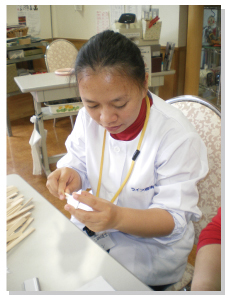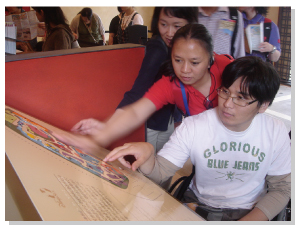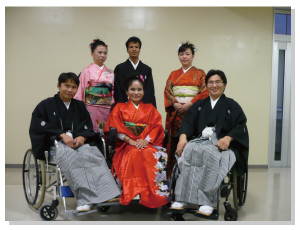- HOME
- Alumni News
- Aileen Bables (9th trainee)
- Aileen's Final Report
Aileen's Final Report
Final Report
My first flight to abroad
I was actually very scared to fly overseas for the first time in my life. But I have dreams. I have ambitions. I want to be a good young leader not only for my home country of the Philippines but also for Asia. So, even though I was very nervous and afraid of what might happen to me in Japan, I took the first step, looking forward to my own development. With high hopes and faith I started my training program in Japan as one of the 9th trainees of the Duskin Leadership Training course in Japan.
It is really very hard to get on with the journey without knowing the language. For example I wanted to order food at a restaurant but I couldn’t, because I did not understand what they were saying. I cannot see, so first I need to taste the food before being able to know what I will be eating. Anyway, food in Japan was delicious so it was not a big problem at all.
Japanese language training
From September to November we studied the Japanese language. Actually, it was very interesting to study Japanese. But because I did not know the Japanese language right from the very beginning it was very hard for me to pronounce the words. I hate the words with syllables like zu, zo, ju, ra, re…etc. English pronunciation is very different from Japanese pronunciation so I had to practice pronunciation very hard. However, I love chatting so it was quite easy for me to memorize the words. We also had to write a weekly report. It was very hard for me because I did not know correct spelling. Imagine, how could I write when I do not know the correct spelling or pronunciation? I always get the vowels o and u mixed up, and I and e. Everyday I needed to wake up early around 1:00 AM to 3:00 AM to study and practice spoken Japanese.
Japanese-Language Proficiency Test
All of the trainees were very nervous. Almost everyday we were worried. Most of all, I was worried about Japanese Braille. I really wanted to insist to let me have a reader when taking the Japanese examination but no matter how much I expressed my opinion I still needed to take the exam in Japanese Braille. I only studied Japanese Braille for about 10 hours before. I knew I was not good at Braille. The examination had limited time so maybe I would not pass the exam due to the incapability to read Braille fast enough. This was one of my unforgettable experiences here in Japan. I hope that if I am ever going to take the Japanese proficiency test again, they have already changed the system. They must face the fact that foreigners are not actually using Braille nor Japanese Braille. So, they must prepare either computers for the blind or at least two readers; one reader and another as a note taker. I think blind people can not cheat at all so they shouldn't be worried about introducing readers.
Home stay
I experienced the Japanese culture through my home-stay in Saga Prefecture. It is funny how my host sister and I had already met but we did not know each other. Until the day before I left Saga, we did not know that we had already met in one meeting. My host sister was the woman who guided us going to the meeting area. It was September so at the time I did not know Japanese. My family felt like my real family. I was so happy having a Japanese family. Japanese people are really very kind. My host family did not speak English. However, I did not find it hard communicating with them. I think it was one thing that I am so glad about. I felt as if I was already good at Japanese.
Individual Training
For my individual training, I went to different places and met different people. Gradually, I learned a lot and had unforgettable experiences.
One thing I would never forget was when I first traveled alone. I needed to go to Hamamatsu. I was actually not yet good at Japanese so I was really scared. But I made it. I was able to accomplish my 3-day training in Hamamatsu. I went back to Tokyo with my new experience. From then on, I started to go everywhere by myself. I feel I can go anywhere now.
My longest training was at Light Friend Association in Kanagawa Prefecture and at Nippon Lighthouse in Osaka. I was so surprised to see the mentally impaired were working. Even the severely disabled people with motor disability had lots of activities that they could enjoy. The disabled in Kanagawa Prefecture can live independently and be treated like normal people. After I finished my training I started to have a lot of dreams and wishes for my country. I want the disabled in my country to be like them. I know it is quite hard to make changes but with all willingness and faith I know I can do the same in the Philippines. I think my training was very successful because my coordinator also tried his best to help me understand all my studies. Mr. Mihara of Light Friend Association could not understand English very much. Me neither. I could not speak and understand Japanese very well but before I started we first had to discuss what I was going to do that day. He would explain to me why I was going to that place. Maybe If Mr. Mihara did not help me understand Japanese words my training would have been difficult because I could not understand anything at all. Actually, I encountered a lot of difficult words so during the training my Japanese language improved significantly.
I was very glad about the volunteer services of Japanese people so I wanted to do the same. I am very thankful that the sheltered workshop of the welfare center for people with disability, in the building adjacent to Toyama Sunrise, allowed me to have volunteer activities in their workshop. I was so happy because I felt they needed me and they were happy being with me. There was friendship and joy of working together. While having the training friendship is very important. Japanese organizations have strong relationships. Most of the organizations know each other. When they see a problem they are open to support each other.
During the training I had two questions that I would never forget. The questions were “what is the most important thing above everything else?” and “what is the meaning of Human Being?” If we knew the answer, we could live normally and with love we could live with happiness and become real friends. The answer is really very hard. But in Japan all of us are regarded as human beings so even though we have disabilities we have the right to live the same way as other normal human beings. We have the right to love and be loved. We have the right to respect and be respected.
In the last month of my individual training, I felt I accomplished a very big project. When I went back to Tokyo it seemed that I brought back more than a very heavy piece of luggage. The luggage contained lots of experiences, knowledge, hope and new dreams. At the same time, I had newfound confidence that I could do anything. I can fly, fly higher in the sky. I have good wings to use while flying. My direction has vision, and from the heart the objectives and new goals have been created.

Group training
After a long road travel all of us trainees got together once again. All of us brought good news and learning.

Lastly
From all the months and days that have passed, I think the best lesson was the changes that happened to me. I know there are a lot of changes in me. My strength, confidence, philosophy and thinking. I do not know how much of my old self remains. I believe I have become a better person that before.
My experience here in Japan will never be forgotten. It will remain the greatest memory of mine. To my friends and lessons; I would like to extend my gratitude to all the freedom being shared and given to me and my country of the Philippines. I hope the good relationship will never end.





